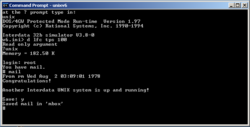UNIX Sixth Edition
| Unix v6 | |
 Logging into a v6 unix system | |
| Type: | Multitasking, multiuser |
|---|---|
| Creator: | AT&T/Western Electric |
| Architecture: | PDP-11 |
| This Version: | v6 |
| Date Released: | 1975 |
UNIX Sixth Edition (often referred to as UNIX V6 or V6 UNIX - 'Unix' was still normally given in all capital letters at this point in time) was one of the most influential early versions of Unix.
It was the base for many important branches of UNIX, including PWB/Unix and the BSD Unix family (it was in fact the first version of Unix to have more than one descendant). It was also one of the more popular Research versions from Bell Labs, appearing as it did shortly after the influential CACM article on Unix.
As distributed from Bell Labs, it ran only on PDP-11s, although outside Bell Labs it was later ported to several other architectures.
It was very similar to the earlier UNIX Fifth Edition; the main change was the support of so-called split I+D space, both in the kernel, and for user programs. It also supported the PDP-11/70 with more than 256 Kbytes of memory, and the resultant UNIBUS map.
UNIX V6 included even more documentation than V5, and also included gems like Programming in C - A Tutorial.
Contents
Other Platforms
In addition to the PDP-11, which was the only machine the original Bell Laboratories distribution of V6 ran on, it was later ported to several other architectures.
Interdata 8/32
The first port of Unix to another architecture was performed outside of Bell Laboratories; V6 was ported to an Interdata 7/32 at the University of Wollongong. This was also the first port to a 32 bit platform, although Bell completed their own port to the very similar Interdata 8/32 shortly thereafter (that port became Unix Seventh Edition).
Intel 80286
There is a port by Szigeti Szabolcs to the Intel 80286 CPU, available in the Unix Archive under Other/V6on286. Requires a copy of MS-DOS to run.
i386
There is a 32bit port to the x86 cpu, called xv6 used by MIT for an OS class. http://pdos.csail.mit.edu/6.828/2006/index.html You can download the source http://pdos.csail.mit.edu/6.828/2006/src/xv6-rev0.tar.gz
Folk Lore
V6 Unix is also famous because of the "Lions book". John Lions at the University of New South Wales wrote up an excellent dissection of the Unix kernel, and taught it in his OS classes.
Unfortunately, the book ran into intellectual property issues with Bell, so its formal distribution was halted; however, it became the guide to Unix internals as it was photo-copied over and over, in a Western equivalent to the samizdat of the old USSR.
Recently, with the open release of older versions of Unix, the intellectual property issues were cleared, and the Lions book is now finally publicly available.
Unix V6 is also the base for a intructional operating system called 'XV6', used in an operating systems course at MIT.
Games
The game situation didn't improve that much from Vv5 to V6.
bj chess cubic moo ttt wump
Running UNIX V6
To install and run Unix V6, one needs a distribution (either an image of a distribution tape, or images of disks), and either an emulator, or an actual PDP-11 or Interdata.
V6 can be run on a PDP-11/23, but it takes a few minor mods to do so.
SIMH
One possibility for an emulator is to use SIMH; you can get V6 by looking for uv6swre.zip and iu6swre.zip, PDP-11 and Interdata versions respectively.
There is also a great lecture series involving SIMH and v6 which can be found here:
- http://wwwlehre.dhbw-stuttgart.de/~helbig/os/index.html
- xv6 homework 4
- xv6 homework 5
- xv6 homework 6
- xv6 homework 7
- xv6 homework 8
Ersatz-11
Another choice for an emulator is Ersatz-11; complete instructions for how to bring up V6 under Ersatz-11 are available, as well as instructions for how to make a more usable V6 under Ersatz-11: see the link below.
See also
- Installing UNIX Sixth Edition
- Installing Unix v6 (PDP-11) on SIMH
- Installing UNIX Sixth Edition on Ersatz-11
| v • d • e UNIX Versions, Vendors and Related |
|---|
| Research Unix PDP-7 UNIX • V1 • V2 • V3 • V4 • V5 • V6 • V7 • V8 • V9 • V10 • LSX • MINI-UNIX • Unix/32V
AT&T - CB-UNIX • PWB/UNIX • USG UNIX • System III • System IV • System V BSD - 2.9 BSD • 2.10 BSD • 2.11 BSD • 3BSD • 4BSD • 4.1 BSD • 4.2 BSD • 4.3 BSD • 4.4 BSD BSD Descendants 386BSD • NetBSD • FreeBSD • OpenBSD • NeXTSTEP • Darwin |
| Other - xv6 • AMIX • SunOS • Solaris • ULTRIX • A/UX • XENIX • AIX • Dell UNIX |
